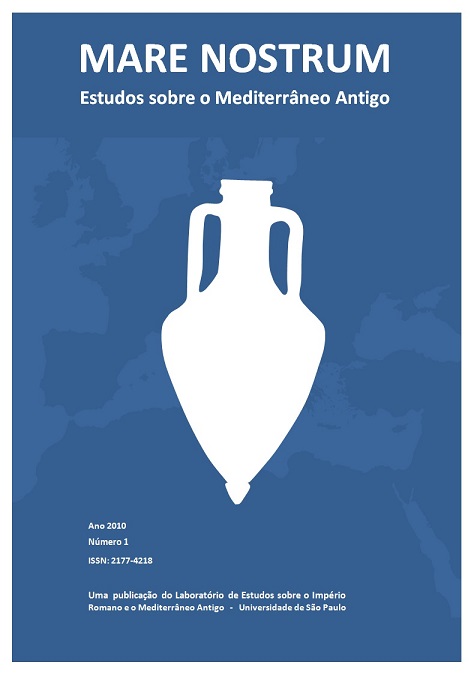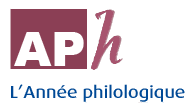Editorial
DOI:
https://doi.org/10.11606/issn.2177-4218.v1i1pi-iPalavras-chave:
EditorialResumo
O primeiro número da Mare Nostrum reúne artigos, resenhas e ensaios produzidos no segundo semestre de 2009, cujos temas, objetos e problemas de pesquisa estão associados a experiências de pesquisas voltadas, em maior ou menor medida, para as questões relativas aos processos de integração no Mediterrâneo Antigo. Este primeiro número tem como principal objetivo iniciar um debate de longo prazo com estudiosos sobre a questão do papel do Mediterrâneo Antigo nos estudos sobre a Antiguidade. A maior parte dos textos aqui publicados, criados em meio ao trabalho de pesquisa e às discussões no Laboratório de Estudos do Império Romano, não têm como objeto principal o problema da integração do Mediterrâneo, mesmo assim, de uma forma ou de outra, este problema está presente neles tangencial, implícita ou até mesmo explicitamente. Este é o espírito com o qual a Revista Mare Nostrum buscará abordar sua questão central: como espaço de publicação de estudos de diversas naturezas e formas sobre a Antiguidade, que possam contribuir direta ou indiretamente para a realização de debates e para a compreensão dos processos de integração das sociedades do Mediterrâneo Antigo. Os sete artigos podem ser divididos em dois grupos: estudos historiográficos e análises de fonte textual. No primeiro grupo encontramos o artigo de Joana Campos Clímaco, que analisa alguns debates da historiografia contemporânea sobre a cidade de Alexandria, particularmente no que diz respeito à natureza grega, egípcia, sincrética ou “original” de sua inserção no mundo egípcio e no Mediterrâneo como um todo; também sobre historiografia versa o artigo de Bruno dos Santos Silva, que procura sumariar os estudos mais recentes acerca da obra de Estrabão e apontar alguns caminhos de pesquisa, especialmente sobre os modos de classificação dos povos da Pensínsula Ibérica; o artigo de Fábio Augusto Morales analisa o modo pelo qual a historiografia contemporânea interpretou a natureza e a inserção social dos metecos na pólis de Atenas durante o período clássico, criticando as visões economicistas e propondo uma abordagem propriamente política; por fim, o artigo de Deivid Valério Gaia busca realizar uma reflexão a respeito da investigação da Economia Antiga, revendo o debate entre primitivistas e modernistas e a necessidade de uma espacialização dos conceitos de história econômica. No segundo grupo de artigos está o de Rafael Costa Campos, sobre a caracterização do imperador Tibério nos Anais de Tácito, discutindo as formatações narrativas da fonte à luz das polêmicas historiográficas contemporâneas; o texto de Gustavo Junqueira Duarte Oliveira, por sua vez, estuda as relações entre o herói e a multidão na Ilíada à luz das categorias de “identidade” e de “efeito-plateia”, refletindo assim sobre o caráter ativo dos guerreiros “que não são os melhores” (a plateia dos feitos heroicos) na identificação e julgamento dos heróis; o artigo de Victor Sá Ramalho Antonio, por sua vez, propõe uma discussão das termas e banhos públicos romanos em termos de processos de construções identitárias, realizando um estudo comparativo de três casos pompeianos e a validade do uso do conceito de romanização. Em seguida, na seção "Laboratório", dedicada a textos experimentais, temos um ensaio de Norberto Guarinello. Neste é desenvolvido de forma ensaística um ângulo de visão do Império Romano que tenta associar a compreensão na longa duração com a necessidade de compreender a realidade social romana como processo em construção e reconstrução, mas que também está baseado em relações de dominação e exploração. Para isso, resgata as principais interpretações que os historiadores modernos apresentaram a respeito do Império Romano (assim como suas conjunturas modernas de desenvolvimento), para em seguida propor o uso das noções de ordem, fronteiras e integração como resposta à recente interpretação baseada nos conceitos de conectividade e fluxos tão sintonizada com a modalidade de Globalização vivenciada a partir dos anos 1990. A Revista fecha com três resenhas: a de Fábio Augusto Morales analisa a obra de Kostas Vassopoulos, Unthinking the Greek Polis; a resenha de Victor Sá Ramalho Antonio analisa Pompeii, the life of a Roman town de Mary Beard; a resenha de Uiran Gebara da Silva analisa a obra de Peter Heather, The Fall of the Roman Empire. Esperamos, portanto, que esse modesto número inicial seja seguido por outros com contribuições mais variadas e pautados por efetivos debates e experimentos intelectuais sobre o problema dos processos de integração social do Mediterrâneo Antigo.Downloads
Os dados de download ainda não estão disponíveis.
Downloads
Publicado
2010-12-28
Edição
Seção
Editorial
Licença
Copyright (c) 2015 Mare Nostrum (São Paulo)

Este trabalho está licenciado sob uma licença Creative Commons Attribution 4.0 International License.
Os conteúdos expressos nos textos publicados pela Mare Nostrum são de exclusiva responsabilidade de seus respectivos autores.
A reprodução dos textos editados pela Mare Nostrum é permitida sob licença Creative Commons, Atribuição-NãoComercial (CC BY-NC).
Autores que publicam nesta revista concordam com os seguintes termos:
- Autores mantém os direitos autorais e concedem à revista o direito de primeira publicação, com o trabalho simultaneamente licenciado sob a Licença Creative Commons Attribution que permite o compartilhamento do trabalho com reconhecimento da autoria e publicação inicial nesta revista.
- Autores têm autorização para assumir contratos adicionais separadamente, para distribuição não-exclusiva da versão do trabalho publicada nesta revista (ex.: publicar em repositório institucional ou como capítulo de livro), com reconhecimento de autoria e publicação inicial nesta revista.
- Autores têm permissão e são estimulados a publicar e distribuir seu trabalho online (ex.: em repositórios institucionais ou na sua página pessoal) a qualquer ponto antes ou durante o processo editorial, já que isso pode gerar alterações produtivas, bem como aumentar o impacto e a citação do trabalho publicado (Veja O Efeito do Acesso Livre).
Como Citar
Editorial. (2010). Mare Nostrum, 1(1), i-i. https://doi.org/10.11606/issn.2177-4218.v1i1pi-i









